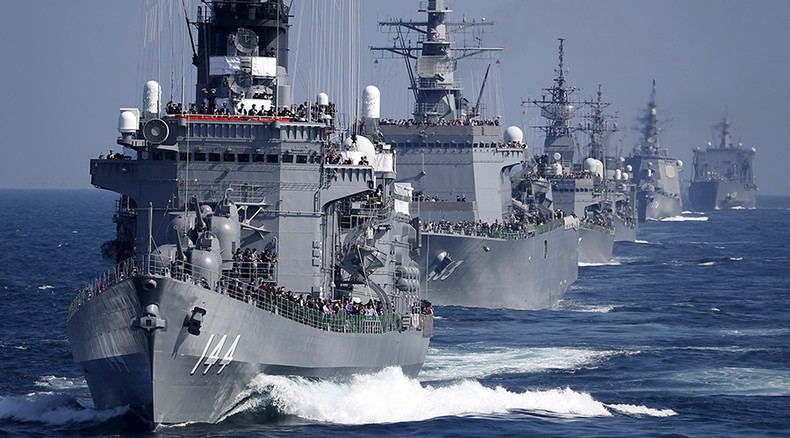- Japan needs rethink on use of offensive weapons
- U.S. Coast Guard to boost Pacific presence to match China
By Isabel Reynolds and Andreo Calonzo
Japan should rethink its rejection of offensive weapons, a senior U.S. military officer said in Tokyo, while the U.S. Coast Guard chief warned of China’s “antagonistic” behavior in disputed waters.
There needs to be a discussion between the government of Japan and the public about the threats that are out there, said the U.S. military officer, who spoke Monday to reporters on condition of anonymity.
The officer cited China as a particular risk.
The pacifism built into Japan’s U.S.-drafted, post-World War II constitution means attempts to bolster defenses frequently face opposition from local residents, even as China and North Korea build up their arsenals of ballistic missiles.
The pacifism built into Japan’s U.S.-drafted, post-World War II constitution means attempts to bolster defenses frequently face opposition from local residents, even as China and North Korea build up their arsenals of ballistic missiles.
Japan, which hosts about 50,000 U.S. military personnel, also places tighter constraints on training than other countries, the officer said.
Japanese Prime Minister Shinzo Abe has increased the defense budget and sought to loosen the constraints of the war-renouncing constitution since taking office in 2012.
Japanese Prime Minister Shinzo Abe has increased the defense budget and sought to loosen the constraints of the war-renouncing constitution since taking office in 2012.
But repairing ties with China, Japan’s biggest trade partner, has also been a priority for his administration.
China’s Reach
The U.S. officer said China has spent heavily to bolster its ballistic missile force, which has rapidly expanded over the years.
China’s Reach
The U.S. officer said China has spent heavily to bolster its ballistic missile force, which has rapidly expanded over the years.
China continues to say publicly it backs peace, stability and security, but its actions don’t match its words as it builds a weapons inventory that threatens Japan as well as others in the region, the officer added.
Japan’s avoidance of offensive weaponry under its constitution is no longer acceptable and should be another topic of discussion with the public, the officer said.
Restrictions on training, such as access to ranges or permission to fly at low altitude or at night, are affecting the ability of both U.S. forces and Japan’s own Self-Defense Forces to prepare for contingencies, the U.S. officer said, adding that Japan should debate the issue soon.
Chinese dictator Xi Jinping rolled out some of the country’s most advanced weaponry in an Oct. 1 parade marking the 70th anniversary of the People’s Republic — a grand demonstration of the country’s growing challenge to U.S. military might.
The Asian nation had a plan to increase its access across the globe, U.S. Coast Guard commandant Admiral Karl Schultz said in a teleconference Monday, as he warned of Beijing’s “coercive and antagonistic” actions in disputed waters.
“China talks about peaceful conduct, and then we see man-made island where there weren’t islands before,” Schultz said when asked to assess Beijing’s actions in the South China Sea.
The U.S. Coast Guard will continue to increase presence and add more vessels in the Pacific amid China’s “expansive intent,” he added.
Japan’s avoidance of offensive weaponry under its constitution is no longer acceptable and should be another topic of discussion with the public, the officer said.
Restrictions on training, such as access to ranges or permission to fly at low altitude or at night, are affecting the ability of both U.S. forces and Japan’s own Self-Defense Forces to prepare for contingencies, the U.S. officer said, adding that Japan should debate the issue soon.
Chinese dictator Xi Jinping rolled out some of the country’s most advanced weaponry in an Oct. 1 parade marking the 70th anniversary of the People’s Republic — a grand demonstration of the country’s growing challenge to U.S. military might.
The Asian nation had a plan to increase its access across the globe, U.S. Coast Guard commandant Admiral Karl Schultz said in a teleconference Monday, as he warned of Beijing’s “coercive and antagonistic” actions in disputed waters.
“China talks about peaceful conduct, and then we see man-made island where there weren’t islands before,” Schultz said when asked to assess Beijing’s actions in the South China Sea.
The U.S. Coast Guard will continue to increase presence and add more vessels in the Pacific amid China’s “expansive intent,” he added.

Aucun commentaire:
Enregistrer un commentaire